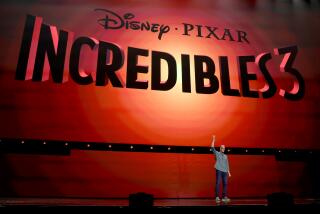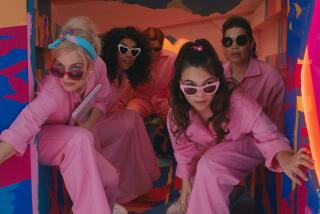Commentary: With ‘Onward,’ Disney continues its token LGBTQ representation. We’re ready for more
“Onward” features an openly LGBTQ character and that’s a big deal — for a Disney film.
Directed by Dan Scanlon, the Pixar production that opened this past weekend is set in a fantasy world where magic has become obsolete. Its residents include elves, fairies, centaurs, manticores and at least one queer cyclops.
Officer Specter is voiced by Lena Waithe, who won an Emmy in 2017 for writing a “Master of None” episode inspired by her own coming out experience. In her one scene in “Onward,” Specter does something no other Pixar character has done before: She casually mentions her same-sex relationship.
“My girlfriend’s daughter got me pulling my hair out,” Specter says to commiserate over the difficulties of being a stepparent.
It’s a historic moment for Disney, which for years has been called out for its dearth of identifiably LGBTQ characters in its films. According to media advocacy group GLAAD, Walt Disney Studios has had the weakest history of LGBTQ inclusion on screen out of all the major film studios the group has been tracking since 2012.
Specter is the first character in any animated Disney film to openly acknowledge being queer in a line of dialogue. That’s significant. But Disney has a pattern of blink-and-you’ll-miss-it LGBTQ moments, and that makes these milestones increasingly difficult to celebrate.
Chris Pratt and Tom Holland play elf brothers on a fantasy quest in Pixar’s lovingly crafted 22nd animated feature.
There was the much-hyped “exclusively gay moment” in 2017’s live-action “Beauty and the Beast” that ended up being more than a little lackluster: Gaston’s sidekick LeFou, whom the film hints harbors some romantic feelings for the arrogant villain, is briefly shown dancing with another man during the celebration at the end of the movie.
The Marvel Cinematic Universe featured its first queer character in 2019’s “Avengers: Endgame” in the form of an unnamed man who appears in one group counseling scene and casually mentions dating men. Credited as “Grieving Man,” he is played by the movie’s co-director Joe Russo.
The “Star Wars” saga followed with its first openly LGBTQ moment in 2019’s “The Rise of Skywalker” by briefly showing two women kissing as the Resistance celebrated its victory. Director JJ Abrams hinted at the scene prior to the film’s release after unequivocally shutting down the possibility of romance between two of the sequel trilogy’s central characters — defected Stormtrooper Finn and Resistance pilot Poe. It was a poor consolation prize.
Meaningful inclusion has been just as elusive in Disney’s animated fare. Although the studio has moved away from queer-coding its villains, LGBTQ characters are often visible only to fans with keen eyes.
Among recent films, possible lesbian couples were spotted in the background of “Toy Story 4” (2019) and “Finding Dory” (2016). Initially spotted in a trailer, “Finding Dory” includes two women shocked to find an octopus in a stroller. When asked whether the women were a couple by USA Today, co-director Andrew Stanton said “they can be whatever you want them to be.”
In “Toy Story 4,” two women can be spotted dropping off and later picking up a child together at kindergarten. “Zootopia” (2016) featured two male antelopes who were confirmed to be a married couple by co-director Jared Bush on witter after audiences took notice of their shared, hyphenated last name in the credits.

With such meager representation, it’s no wonder a legion of fans have felt kinship with Elsa from “Frozen” (2013) and have claimed her as queer because she conveniently has never had an opposite-sex love interest. (“Saturday Night Live” even had Kate McKinnon play Elsa’s coming out for laughs in a sketch this season, but fan campaigns to get Elsa an actual girlfriend have so far remained unsuccessful.)
At a time when audiences are seeing increasingly meaningful queer representation in family-friendly TV shows, the tiny moments in Disney films are especially exasperating because they almost appear to be erasable by design.
And sometimes — when the films hit international markets — they do just get erased. Russia has reportedly censored Officer Spector’s scene in “Onward” by replacing the word “girlfriend” with “partner.” The film has also reportedly been banned in countries including Kuwait, Oman, Qatar and Saudi Arabia for the “girlfriend” reference.
Disney’s refusal to cut LeFou’s moment in “Beauty and the Beast” led to it being banned in Malaysia. But “The Rise of Skywalker’s” lesbian kiss was cut for some international markets such as Singapore and the United Arab Emirates, and the scene in “Endgame” was cut from the Russian release.
It’s difficult to be convinced that any moment is significant if it can be excised from international versions without hurting the story. And it’s a disservice to the actual LGBTQ people who have helped Disney’s ascendance as an entertainment powerhouse.
Meaningful queer representation is important because seeing our lives and realities reflected in television affects how we see ourselves. LGBTQ kids and those growing up with LGBTQ families deserve to see their experiences reflected in family-friendly movies and TV shows too.
For now, TV remains the more LGBTQ-inclusive medium, even among cartoons with shows such as “Steven Universe,” “She-Ra and the Princesses of Power” and “Arthur” continuing to break ground.
Through the everyday adventures of a half-magical alien boy and his growing group of friends, Rebecca Sugar wants to make sure everybody feels seen.
Disney’s TV shows are frequently more LGBTQ-inclusive than Disney movies. The Disney+ series “High School Musical: The Musical: The Series” introduced the franchise’s first gay love story last year. “Andi Mack” featured Disney Channel’s first coming-out story line, which earned it a GLAAD Media Award in 2018. And though the upcoming “Love, Simon” spinoff “Love, Victor” has been moved from Disney+ to the more adult-oriented Hulu, the decision is reportedly due to its “general sexual exploration” and not for its LGBTQ content.
Some upcoming Disney titles suggest that at least one arm of the studio is moving in a more inclusive direction. The MCU’s upcoming “The Eternals,” slated for release in November, will feature an openly gay superhero who is married and has a family. The married couple will even reportedly share a kiss in the film. And it’s expected that Tessa Thompson’s Valkyrie will be looking for her queen in 2021’s “Thor: Love and Thunder.”
Hopefully, another animated LGBTQ Disney character will not be far behind — and maybe this time be in more than one scene.
More to Read
Only good movies
Get the Indie Focus newsletter, Mark Olsen's weekly guide to the world of cinema.
You may occasionally receive promotional content from the Los Angeles Times.












